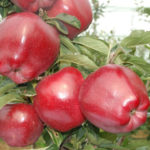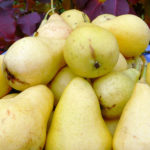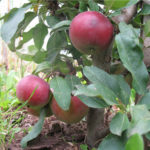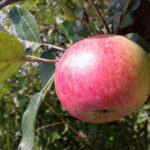Pear variety in Memory of Yakovlev
The pear has always been associated with the sun and the south. That is why, in central Russia, for a long time, preference was given to more resistant apple trees. But thanks to the work of breeders, which began to be carried out even under I. In Michurin, the thermophilic tree began to gradually master the cool regions. Further more. Scientific work on instilling a culture of winter hardiness was continued by a student and follower of the famous scientist P.N. Yakovlev. Famous pear varieties Severyanka, Favorite Yakovlev, Autumn Yakovleva have already registered in the gardens of the Central Black Earth Zone. But breeding for the improvement of culture continued. Another novelty was in the works, on which P.N. Yakovlev worked together with his son S.P. Yakovlev and research workers Ya.S. Nesterov and R.M. Korshikova. The parent forms were selected Topic, as a donor of winter hardiness, and the old French variety Olivier de Serre. Unfortunately, at the time of filing an application for registration of a new variety of P.N. Yakovlev did not live, therefore this culture was dedicated to the scientist, naming a pear in his honor - in memory of Yakovlev. In 1985, it was entered into the State Register of Breeding Achievements of Russia with admission in the Central, Volgo-Vyatka, Middle Volga regions and the Central Black Earth District. The new look turned out to be very successful. It is popular not only among gardeners, but also among breeders, as a donor of restrained growth, winter hardiness and disease resistance.
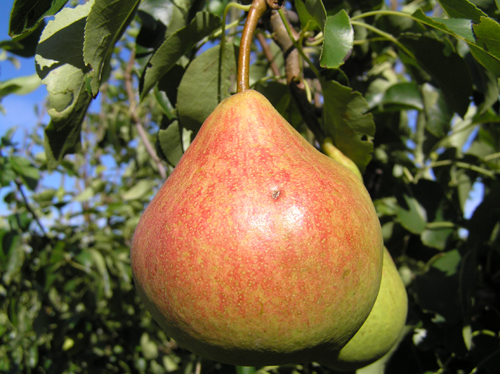
Description
The plant is fast growing, but the height of an adult tree usually does not exceed 2.0 meters. The crown is rounded, compact, not too dense. By the age of ten, the projection of the crown can be 6.5 square meters. Skeletal branches extend from the trunk at an angle close to a straight line. With age, numerous branched ringlets are formed - thick and short formations on which pear fruiting occurs. The bark covering the bole and the main branches is gray. On young branches, it is smooth, with age it becomes highly flaky. The variety is distinguished by a fairly high kidney awakening. The plant is dominated by two types of fruit formation - simple and complex ringlets. Shoot-forming ability in Memory of Yakovlev is also high. Shoots of medium thickness, geniculate, light brown with small and infrequently located lenticels. An insignificant disadvantage is the frequent appearance of thorns. Leaves are of normal size, with a twisted top, obovate, with a serrated edge, green in color. The plate is leathery, slightly curved. The petiole is long, the stipules are lanceolate, of medium size. The buds are conical, smooth, grow deviating from the shoot, the subrenal cushion is very large. The flowers are large, not double, white. The petals are separate, with smooth edges, the stigma is at the level of the anthers. The inflorescence consists of 4 - 6 saucer-shaped flowers.
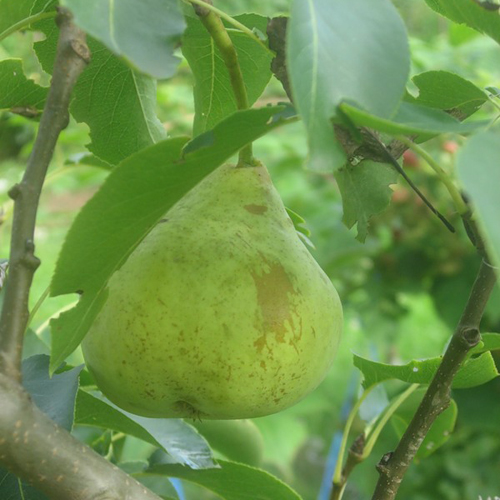
The fruits of the variety are wide pear-shaped, with a smooth surface or slightly ribbed. True, the older the tree, the more lumpy the fruits become. With the maximum workload of Yakovlev's memory with the harvest, uneven fruits can be observed. Usually pears are of average size, weight according to the State Register is 125 grams. In other sources, the weight is indicated as 130 - 150 grams, the maximum weight is 200 - 250 grams. The skin is dense, delicate, shiny. At the moment of ripening, the main color of the fruit is light yellow, the integumentary color appears on an insignificant part of the surface in the form of a light tan. In the period of consumer ripeness, the color of the fruit becomes golden yellow, with an orange blush. There are few subcutaneous points. The peduncle is of medium thickness, long, curved. The saucer is small, narrow, slightly ribbed, the cup is half-open. The funnel is absent or very shallow. The heart is medium, the seed chambers are closed, small, the subacheal tube is medium, cauliflower.The pulp is of a pleasant creamy color, juicy, semi-oily consistency, not tart, with a pleasant aroma. Its only drawback is the presence of small granulation around the seed chamber, the so-called stony cells. The taste is very good, sweet and sour. Many people compare the taste of our heroine with the Chizhovskaya pear. Nevertheless, the tasters differ in their assessment, putting them from 3.8 to 4.4 points. 100 grams of pulp contains: sugars - 12%, acids - 0.25%, ascorbic acid - 9 mg, catechins - 30.2 mg. The culture is prized for its significant amount of arbutin, which has excellent antimicrobial properties. There is more of this substance in the fruits of this variety than in the leaves of lingonberry.
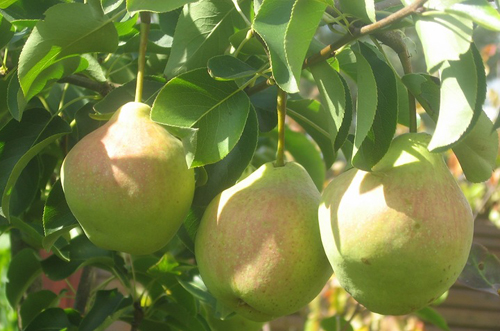
Characteristics
- In memory of Yakovlev, it can be safely attributed to early-ripening, because unlike most crops that enter the fruiting period after 6 years, our heroine already after 3 - 4 years, a maximum of 5 years, brings the first harvest;
- in terms of ripening, the State Register classifies the variety as early autumn - ripening begins in early September. But this largely depends on the climate and location of the tree. That is why many gardeners call the variety summer, and the harvest begins to take off in the second half of August. But in cooler regions, pear harvesting can take until October. And sometimes you have to remove the fruits that have not yet ripened, but, according to reviews, they are perfectly ripened at home;
- the yield in Memory of Yakovlev is excellent, despite the small size of the plant. About 20 kg are harvested from a 7-year-old tree, and then the yield increases rapidly, and about 100 kg are already removed from a 10-year-old crop. During the full fruiting period - more than 220 kg / ha. At the same time, there is a high stability of fruiting, which is not interrupted even in unfavorable years;
- according to the originators, the fruits are quite firmly adhered to the branches. But gardeners note that after a month has passed since the beginning of ripening, fruits may fall off;
- as a hybrid of the second generation from the Ussuri pear, our heroine has high winter hardiness. The degree of freezing of annual branches after artificial freezing in the middle of winter to -38 ° С did not exceed 0.6 points. In extreme wintering conditions, this indicator did not exceed 1.5 - 2.0 points. Yakovlev's memory is resistant to low temperatures and spring temperature extremes. The plant bore fruit even when slight frosts were observed during the flowering period. After the harsh winter of 2005-2006, the yield of an adult plant was on par with favorable years. The State Register recorded the level of winter hardiness of the variety above average;
- the degree of recovery after possible freezing is very high;
- but the culture cannot boast of drought resistance, therefore, the yield and quality of the fruits will depend on watering;
- the variety has a fairly high degree of self-fertility, it can be safely used in single plantings. But if you drop off next to Lada or Augustow, then the quality of the crop will improve markedly;
- disease resistance is high, especially in memory of Yakovlev is valued for its ability to resist scab and septoria. Pear leaves can suffer from gall mites. Our heroine liked the wasps, which cause rot on the fruits;
- the transportability of the fruits harvested during the period of technical ripeness is very high;
- conducted research to identify keeping quality showed the following results. At temperatures from 0 ° C to -1 ° C and relative humidity of 94 - 96%, the shelf life can last from 1 to 2 months. But it was also revealed that the fruits during the storage period suffer moderately from fungal rot and decay of the pulp from old age, to a lesser extent suffer from the browning of the skin from old age and are resistant to internal browning;
- the way of using the crop is universal. In addition to being consumed in its natural form, the fruits of this variety are highly appreciated as a high-quality product for processing into compote and jam.
Planting and leaving
Experienced gardeners recommend the autumn planting of pears, the main thing is that the seedling should have about 3 weeks before the onset of stable cold weather.Peat bogs, sandy soils or wetlands are not suitable for planting in Memory of Yakovlev. In such conditions, the culture will be sick, and there can be no question of any fruiting. So cultivated loams or sandy loams are the most suitable for the variety of soil. The place should be sunny. To avoid clumping, stick to a 6 x 3 meter or 5 x 3 meter planting pattern. The next spring, after planting, start forming the crown. The most suitable forms are sparse-tiered or fusiform. In leaving, our heroine is not picky. But one should take into account the lack of drought tolerance. Water a young tree more often, an adult a little less often, but always take into account natural precipitation, the roots should not suffer from waterlogging. Fertilize by combining mineral fertilizers with organic ones.
For many years of cultivation, gardeners were able to appreciate the memory of Yakovlev quite high. Due to its good early maturity, stable and high yield, disease resistance and winter hardiness, this variety can be successfully cultivated not only in private but also in industrial plantings. Thanks to self-fertility and small growth, every pear lover will be able to plant a tree even in a small garden, the main thing is to find a worthy place for it. The advantages include easy harvesting, because the tree is not tall. But the ideal culture, for all its merits, still cannot be called. The main obstacle in the path of a novice gardener is the correct formation of the crown. On unsuitable soils, you will have to tinker with preparing the correct planting hole - it will be larger and you need to fill it with nutritious and loose soil. But without this there is no way, because a pear in one place will grow and bear fruit for many years. In addition, disputes can cause the taste of Yakovlev's memory and the presence of hard granules in the pulp.
